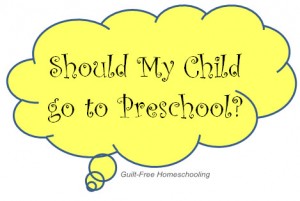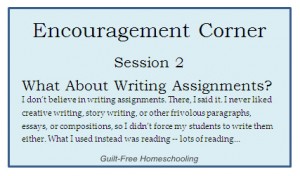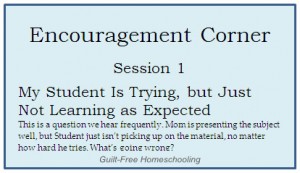Encouragement Corner posts are sort of a mini-seminar for the busy moms who can’t spare the time or expense to go to a major homeschooling conference, but who still need answers to their biggest questions. We’ll be grouping a few of the most-often-recommended articles around a central issue and making those articles easier to share on Pinterest by adding a photo or graphic as needed.
I’m seeing a disturbing trend. More and more families are sending their babies off to preschool at younger and younger ages—sometimes as young as two years old. Now tell me what skills a preschool teacher could possibly impart to two- or three-year-olds that Mom couldn’t do better, faster, and cheaper? Spare me the argument that Mom has to work—that’s another topic for another day (besides, that simply means that the preschool is a more expensive version of day-care, yet another topic for yet another day). I’m really confused by why any parent would think a child of 2 or 3 needs preschool, or why that parent needs to shell out their hard-earned paycheck for someone else to teach their child of 2 or 3 to identify the red ball or the blue square or to count to 10 or sing Old MacDonald Had a Farm.
Yes, my children did both attend preschool, but not at age 2 or even 3, and if I could do it over again, I wouldn’t send them anywhere. My daughter was 4, my son was 5 (late birthday), and they each went for only one year before moving on to Kindergarten. (We also weren’t planning to homeschool at that time, and homeschooling hadn’t even become legal in our state yet.) I’m not sure that my kids gained anything from their preschool experiences—my daughter’s preschool teacher remarked that she often felt that she didn’t need to show up, since my child was a suitable substitute. My son’s preschool class included our friends’ brother-sister twins, who had just turned 3, and my son could be a teensy bit resentful at times that those little kids were in his school class. It was a small class with a wide age range, but there is a huge difference between what 3-year-olds can do and understand and what 5-year-olds can do and understand.
I had sent my kids to preschool as preparation for Kindergarten, for the group experiences of sitting in circles and learning to wait for their turn. As it turned out, I shouldn’t have wasted the money—they were already much better prepared than most of their classmates. The things we had done at home as normal childhood playing were excellent preparation for preschool, for Kindergarten, and for learning in general. I had been holding them in my lap for “story time” from the moment they could focus on a picture book, and it was our daily settling-down session before naptime. I talked about the pictures and pointed out colors and shapes and girls and boys and bears and mice and bowls and hats long before my babies knew what I was talking about, but they loved the lap time, and they learned vocabulary and language, as well as colors, shapes, animals, and objects. We had played games at home, and they had learned to take turns, even when Mom was their only playmate. We had played make-believe with toy dishes and toy tools and dress-up clothes. We had played on swings and walked on a balance beam (a board lying flat on the ground) and climbed on monkey bars and jumped on hopscotch squares on the sidewalk. We had kicked balls, thrown balls, batted balls, rolled balls, and caught balls. We had drawn and colored and painted and sculpted and glued and cut with scissors. Seriously, what else could they possibly have learned at preschool that they didn’t already know? That Mom was too busy to spend time with them? That Mom’s job was more important than they were? That children are supposed to be shuttled off away from home and locked in an institutional classroom for so many hours each day to be looked after by strangers?
Here are the most important things to know about teaching your children:
- Children can not learn more at school, even preschool, than they can learn at home, and no advanced degree is necessary for teaching a child to sing the alphabet song.
- The theory that “Everyone sends their kids to school” is mob mentality that deserves to be questioned. Why does everyone else send their kids to school? It certainly isn’t for the superior outcome.
- The theory that “If you don’t send your kids to school, you’re trying to hold onto them as babies, and you’re afraid to let them grow up” is also flawed. I happen to think that 2- to 3-year-olds (for preschool) or even 5- or 6-year-olds (for Kindergarten) are much too young to take on the world. Those children need to be at home with Mom, discovering who they are and learning how to react to the world at large under Mom’s protective care. Yes, I’m saying it blatantly: children need to be kept under Mom’s wing until they are ready to be on their own. It certainly didn’t hurt George Washington or Abraham Lincoln or Thomas Edison (or countless others throughout history who didn’t go to institutional schools) to stay home with their mothers.
- Those uncomfortable knots in your stomach do not mean that you will succumb to loneliness and despair during the 2 ½-3 hours while Little Darling is gone to Preschool each day. That anxiety is trying to tell you that sending your little one off to school is a bad idea in general. Preschool is essentially a “gateway drug” to get parents accustomed to the idea of giving up their children to the control of the institution—why else do you think it’s being pushed for younger and younger children?
- Yet another theory says “That school has good teachers—their values are just like yours.” I had 30+ different teachers and administrators from Kindergarten through 12th grade, and very few of them portrayed the value system I have now. There may have been a small handful of them who were concerned about me personally for the brief period when I was under their authority, but the system in general defeated any efforts on their part to connect with me. My kids had more than 15 different teachers in only 6 years at church-sponsored preschools and public schools, and the values exhibited by most of those teachers were dramatically different from our family’s values.
- Mommies are excellent teachers, primarily because they are the mommies of their students. Mommies can tell instinctively when their child is bored, tired, hungry, or jealous, and can tell which of those feelings is responsible for him acting out.
- A child’s home usually has a ready supply of educational equipment, including building blocks, measuring cups, and empty bathroom tissue tubes.
- Anything else you need to know can be found in the following articles.
Preschool Is Not Brain Surgery
Social Skills—What Should I Teach My Preschooler?
Preschoolers’ Educational School-Time Activities
Teaching with Preschoolers Around… and Under… and on Top… and Beside
The Importance of Play in Education
The Value of Supplemental Activities
“Stealth Learning” Through Free Play
Don’t overlook this one—even though it says Kindergarten, it is equally applicable to Preschool…
Time for Kindergarten Round-Up?
And finally…
The Myth of Age-Mates




 Guilt-Free Homeschooling is the creation of Carolyn Morrison and her daughter, Jennifer Leonhard. After serious disappointments with public school, Carolyn spent the next 11 years homeschooling her two children, from elementary to high school graduation and college admission. Refusing to force new homeschooling families to re-invent the wheel, Carolyn and Jennifer now share their encouragement, support, tips, and tricks, filling their blog with "all the answers we were looking for as a new-to-homeschooling family" and making this website a valuable resource for parents, not just a daily journal. Guilt-Free Homeschooling -- Equipping Parents for Homeschooling Success!
Guilt-Free Homeschooling is the creation of Carolyn Morrison and her daughter, Jennifer Leonhard. After serious disappointments with public school, Carolyn spent the next 11 years homeschooling her two children, from elementary to high school graduation and college admission. Refusing to force new homeschooling families to re-invent the wheel, Carolyn and Jennifer now share their encouragement, support, tips, and tricks, filling their blog with "all the answers we were looking for as a new-to-homeschooling family" and making this website a valuable resource for parents, not just a daily journal. Guilt-Free Homeschooling -- Equipping Parents for Homeschooling Success!

Recent Comments